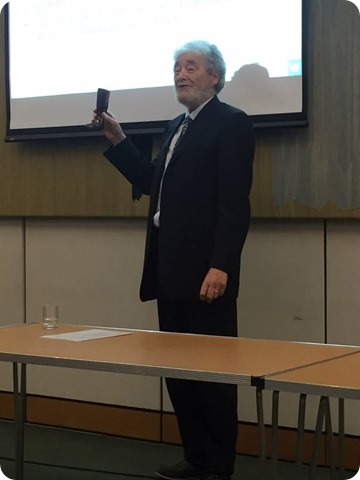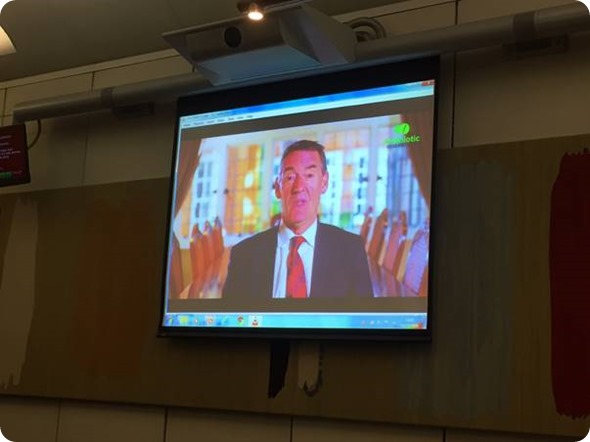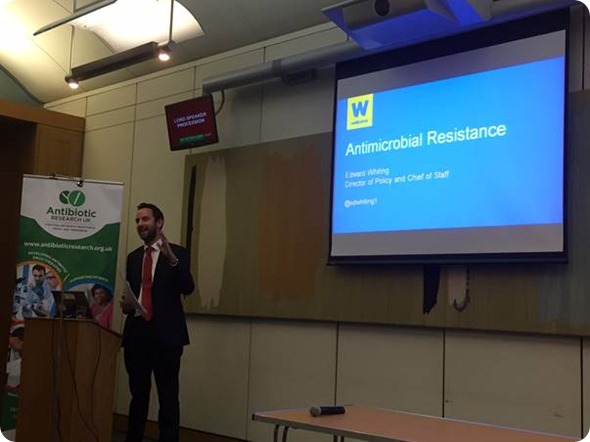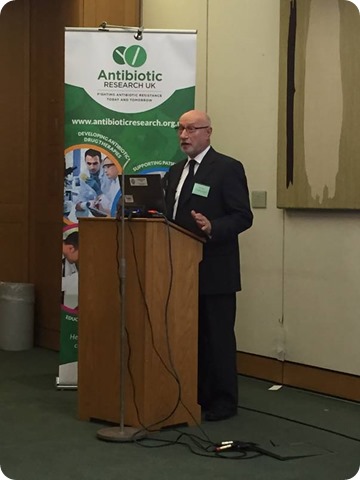“This is our moment to tackle antimicrobial resistance (AMR),” declared Ed Whiting, Head of Policy and Chief of Staff, Wellcome Trust, London at Antibiotic Research UK’s inaugural lecture held at Portcullis House, Westminster today. Ed’s pragmatic discussion mirrored the theme of the event: turning ideas in action.
For many of us, superbugs are something we frequently hear about in the news and think of as a future threat. However, talks given by AMR sufferers at today’s event highlighted the impact that AMR is already having on people’s lives.
David Battie described his devastating fall which resulted in a severe infection after a complex fracture in his leg. After undergoing a total of 10 operations, it was found that David was resistant to the antibiotics and had the option of either having his leg removed or undergoing plastic surgery. He opted for the latter and is thankfully now doing well and sharing his story to raise awareness of antibiotic resistance and the importance of research.

David Battie raises a toast to antibiotic research, drinking from an antique glass vase in the form of a leg, very similar in structure to the stainless steel scaffold he had as part of his treatment.
Emily Morris also shared her story of frequent battles with antimicrobial resistant E. coli including ESBL over the past 8 years. Her pregnancy in 2013 was particularly problematic, as she faced an ESBL attack in her first trimester and a strep B infection in her third trimester. Like David, Emily is now looking to raise awareness of antibiotic resistance and her fiancé is doing a charity run to raise money for Antibiotic Research UK.

Lord Jim O’Neill gives a pre-recorded video on the economic cost of antimicrobial resistance.
Money is certainly needed to tackle AMR. A video recording from Lord Jim O’Neill, who unfortunately could not attend the event for personal reasons, highlighted that $40 billion USD is needed over 10 years to avoid 10 million deaths from AMR by 2050. Whilst this may seem a staggering amount, the global loss of GDP from AMR by 2050 is projected to be $100 trillion USD and thereby as Lord O’Neill, an economist by background, stated the investment return would be 2,500%.
Ed Whiting focused on the human cost of AMR, which is estimated to be around 700,000 deaths currently. This is thought to be a low estimate due to the challenge of tracking AMR, an area Ed urged for further thought. Chief Executive of Antibiotic Resistance UK, Professor Colin Garner, later put forward the concept of an AMR registry to help tackle this problem.
Ed outlined the many causes of AMR including poor infection control practices and the use of antimicrobials in agriculture. He also highlighted the discovery void of antibiotics since 1987 and whilst there are 37 in development at present, this is a fraction of the number of cancer drugs, around 800, that are currently in Phase I-III.
Furthermore, Ed explained the difference between gram positive bacteria and the more complex-structured gram negative bacteria, the latter being more difficult to tackle. Of the 37 new antibiotics in development, only 11 are aimed at treating gram negative bacteria.

Ed Whiting, Head of Policy and Chief of Staff, Wellcome Trust, London gives Antibiotic Research UK’s inaugural lecture.
As we all know, new antibiotics are likely to take a significant amount of time to develop, perhaps even 20 years according to Dr David Brown, Science Committee Chair of Antibiotic Research UK. In the meantime, Dr Brown declared that antibiotic resistance breakers (ARBs) must fill this gap.
ARBs are drugs, or other substances, that may be used alongside antibiotics in order to break resistance. This is not a new concept, however, it is one that needs to be extended as it could make a rapid contribution to tackling AMR according to Dr Brown. Another area of research is exploring the potential to exploit the immune system to solve AMR.

Professor Colin Garner, Chief Executive of Antibiotic Research UK, summing up.
Professor Colin Garner concluded the event by requesting assistance in raising awareness of antibiotic resistance through social media and also through volunteers and campaigners to help solve AMR.
For more information on Antibiotic Research UK, please visit their website: http://www.antibioticresearch.org.uk/